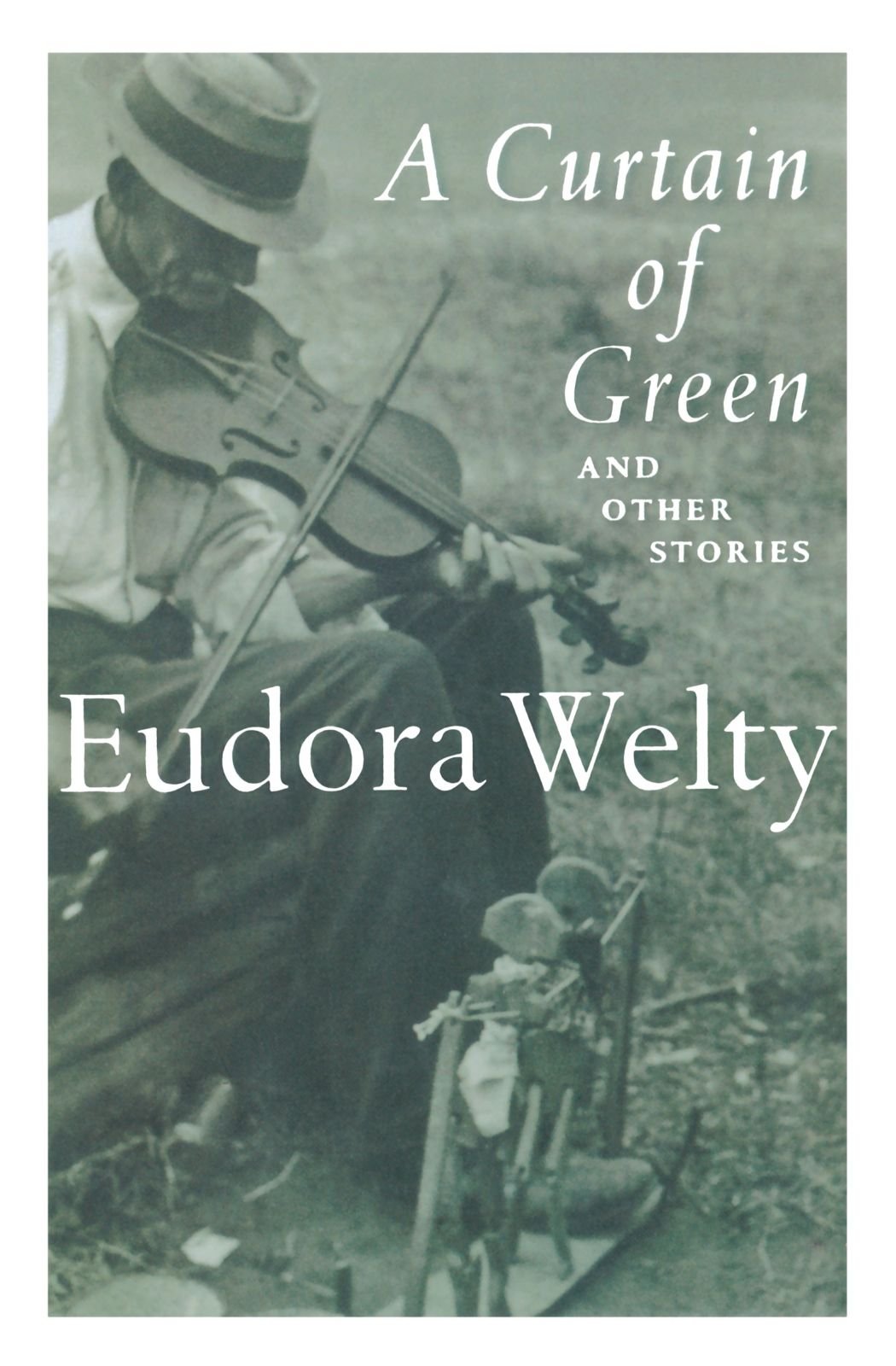
photo crop © Pieter Vanhaecke, 2005
*
In this longlisted essay from the 2016 THRESHOLDS Feature Writing Competition, David Butler finds a distinctive universe, the human condition and entertainment in Eudora Welty’s ‘A Worn Path’.
~
“Dance, old scarecrow,” she said, “while I dancing with you.” – An Appreciation of ‘A Worn Path’ by Eudora Welty
by David Butler
Its economy notwithstanding, there are a number of things one looks for in an exceptional short story. The first is that it establish its own distinctive universe, a matter not only of the choice of character, theme and setting, but the selection of imagery and language. The second is that, in spite of its necessary concern with the particular, it have some commerce with the universal, something to say about the human condition. The third is that it entertain.
It was December – a bright frozen day in the early morning. Far out in the country there was an old Negro woman with her head tied in a red rag, coming along a path through the pinewoods.
So begins ‘A Worn Path’, Eudora Welty’s classic story published in her debut collection, A Curtain of Green & Other Stories, from 1941. The language is simple and lucid, consisting almost entirely of words of one or two syllables. The woman, her name is Phoenix Jackson, ‘was very old and small and she walked slowly in the dark pine shadows, moving a little from side to side in her steps…’ It is how she might have described herself, until we are met by the marvellously resonant comparison with ‘the balanced heaviness and lightness of a pendulum in a grand-father clock’.
 ‘An old Negro woman with her head tied in a red rag, coming along a path…’ It is a world contiguous with that of the Brer Rabbit stories of Uncle Remus and, like them, it has something of the quality of myth. The journey perilous is one of the archetypal patterns, one of the ‘seven basic plots’ identified by Christopher Booker in his best-selling study of the same name. The woman encounters a series of obstacles, increasingly dangerous as the journey proceeds. At first these are natural: a steep hill; a thorn-bush; a log over a stream; sleeping alligators. Then they are manmade: a scarecrow-ghost; a barbed-wire fence; a black dog with lolling tongue, followed by a white hunter who points his rifle at her chest. All before she eventually arrives in the precincts of the town. For the bulk of the story, the purpose of the pilgrim’s progress of this indomitable nonagenarian is teasingly withheld.
‘An old Negro woman with her head tied in a red rag, coming along a path…’ It is a world contiguous with that of the Brer Rabbit stories of Uncle Remus and, like them, it has something of the quality of myth. The journey perilous is one of the archetypal patterns, one of the ‘seven basic plots’ identified by Christopher Booker in his best-selling study of the same name. The woman encounters a series of obstacles, increasingly dangerous as the journey proceeds. At first these are natural: a steep hill; a thorn-bush; a log over a stream; sleeping alligators. Then they are manmade: a scarecrow-ghost; a barbed-wire fence; a black dog with lolling tongue, followed by a white hunter who points his rifle at her chest. All before she eventually arrives in the precincts of the town. For the bulk of the story, the purpose of the pilgrim’s progress of this indomitable nonagenarian is teasingly withheld.
What really lifts the story out of the realm of the ordinary, what animates it, is the delightfully incongruous, ungrammatical commentary that ‘Old Phoenix’ delivers. There’s nothing interior about this monologue; she gives voice to her thoughts as they arise.
“Seem like there is chains about my feet, time I get this far,” she said, in the voice of argument old people keep to use with themselves. “Something always take a hold of me on this hill – pleads I should stay.”
The early reference to chains is valent. Toward the end of the story, she discloses: “I never did go to school, I was too old at the Surrender.” This is a southern Negro woman who grew up under slavery. Small wonder, then, that she finds the threat from humans more menacing than purely natural ones. When she is snagged by a briar, in a scene that recalls ‘Brer Rabbit and the Tar Baby’, she is sanguine: “Thorns, you doing your appointed work. Never want to let folks pass, no sir.” The strands of barbed-wire she must crawl under are far more sinister. In an uncharacteristic shift to reported speech, the narrator explains:
But she talked loudly to herself: she could not let her dress be torn now, so late in the day, and she could not pay for having her arm or her leg sawed off if she got caught fast where she was.
Earlier, she had seen ‘big dead trees, like black men with one arm…’
A striking early ordeal arises when she comes to the log fording a creek. Her method of attempting the perilous right-of-passage is striking:
“Now comes the trial,” said Phoenix. Putting her right foot out, she mounted the log and shut her eyes. Lifting her skirt, leveling her cane fiercely before her, like a festival figure in some parade, she began to march across. Then she opened her eyes and she was safe on the other side. “I wasn’t as old as I thought,” she said.
There is nothing tentative, here. She mounts the log, levels her cane fiercely, and with eyes shut marches across. Compare this to her normal progression, caught in a delicate image:
She carried a thin, small cane made from an umbrella, and with this she kept tapping the frozen earth in front of her. This made a grave and persistent noise in the still air, that seemed meditative like the chirping of a solitary little bird.
It is an image strong enough to be recalled at the story’s end, when we learn of her ailing grandson who awaits her return: “He wear a little patch quilt and peep out holding his mouth open like a little bird.”
So used is Old Phoenix to talking to herself that there is little discernible difference in her speech when an addressee is present. In one of the most delightful exchanges, after a dog has knocked her over and she’s tumbled into a ditch ‘like a little puff of milkweed’, she replies to the hunter’s comment of “Well, Granny! What are you doing there?” with: “Lying on my back like a June-bug waiting to be fumed over, mister.” She is utterly fearless, and when the hunter mischievously points his gun at her and asks, “Doesn’t the gun scare you?”, she holds ‘utterly still’ and says: “No, sir, I seen plenty go off closer by, in my day, and for less than what I done.” She assumes, mistakenly, that he intends to shoot her for purloining a coin – a nickel – that he inadvertently dropped. In fact, this action has provoked her first real crisis as she gives in to an archetypal temptation. ‘Her lips moved. “God watching me the whole time. I come to stealing.”’
In addition to negotiating natural and manmade hazards and overcoming temptations, epic wanderers – Odysseus, Aeneas, Dante – must typically descend to the underworld to encounter shades, an encounter alluded to when Old Phoenix mistakes a scarecrow for a ghost. Well worth reproducing in its entirety, this vignette occurs just after she crosses a maze of whispering corn (a pun on maize, no doubt):
She passed through the old cotton and went into a field of dead corn. It whispered and shook and was taller than her head. “Through the maze now,” she said, for there was no path.
___Then there was something tall, black, and skinny there, moving before her.
___At first she took it for a man. It could have been a man dancing in the field.
___But she stood still and listened, and it did not make a sound. It was as silent as a ghost.
___“Ghost,” she said sharply, “who be you the ghost of? For I have heard of nary death close by.”
___But there was no answer – only the ragged dancing in the wind.
___She shut her eyes, reached out her hand, and touched a sleeve. She found a coat and inside that an emptiness, cold as ice.
___“You scarecrow,” she said. Her face lighted. “I ought to be shut up for good,” she said with laughter. “My senses is gone. I too old. I the oldest people I ever know. Dance, old scarecrow,” she said, “while I dancing with you.”
What impresses is not only the indomitable spirit, it is the irrepressible joie de vivre of Phoenix Jackson, even though ‘I the oldest people I ever know’.
 My one small quibble in the perfection of this story is in the naming. Eudora Welty was born in 1909 in Jackson, Mississippi, and died there at the age of ninety-two, so perhaps it was natural she should choose Jackson as her protagonist’s surname. Phoenix, though, presses a little too insistently to be read in terms of the mythological bird rising from its own ashes. It is the minutest of quibbles. Indeed, one wonders if there is, in the choice, even a particular aptness, insofar as the grandchild Old Phoenix is animated to protect, by her monthly journey to the town, burned his throat two years previously by swallowing lye, an alkali cleaning solution made from ash.
My one small quibble in the perfection of this story is in the naming. Eudora Welty was born in 1909 in Jackson, Mississippi, and died there at the age of ninety-two, so perhaps it was natural she should choose Jackson as her protagonist’s surname. Phoenix, though, presses a little too insistently to be read in terms of the mythological bird rising from its own ashes. It is the minutest of quibbles. Indeed, one wonders if there is, in the choice, even a particular aptness, insofar as the grandchild Old Phoenix is animated to protect, by her monthly journey to the town, burned his throat two years previously by swallowing lye, an alkali cleaning solution made from ash.
The economy of the story aspires to the perfect economy of the miniature, in which every detail, every image, finds its echo. If the encounter with the briar finds its human counterpart in the strands of barbed wire, the initial ascent up the pinewood is echoed, toward the end, by the climb up the stairs to the medical officer. There, the fallen nickel she appropriated is matched by a gift of another, the pair together making up the price of a Christmas gift she will carry back to her grandson along with his medicine. ‘”Well, Granny,” the hunter had said, “you must be a hundred years old, and scared of nothing. I’d give you a dime if I had any money with me.’ Her sin has been symbolically forgiven. The Christmas gift she wishes to carry back is itself a haunting metaphor for this most precarious heroine:
“I going to the store and buy my child a little windmill they sells, made out of paper. He going to find it hard to believe there such a thing in the world. I’ll march myself back where he waiting, holding it straight up in this hand.”
A paper windmill! The image cannot help but recall how weightless Old Phoenix was when the black dog bundled her into the ditch: ‘like a little puff of milkweed.’
One comes away from this extraordinary story, as from Hemingway’s The Old Man and the Sea, with a renewed belief in the indomitability of the human spirit. Robert Lowell is quoted as stating that ‘a short story demands almost poetic perfection’. He was right, except for that little word ‘almost’.
~
 A former lecturer in English and Spanish literature, David Butler works as a full time writer. His most recent novel, City of Dis (New Island), was shortlisted for the Kerry Group Irish Novel of the Year, 2015. Other literary prizes include the Maria Edgeworth and Fish International awards for the short story, the SCDA and Cork Arts Theatre awards for drama, and the Feile Filiochta and Brendan Kennelly awards for poetry.
A former lecturer in English and Spanish literature, David Butler works as a full time writer. His most recent novel, City of Dis (New Island), was shortlisted for the Kerry Group Irish Novel of the Year, 2015. Other literary prizes include the Maria Edgeworth and Fish International awards for the short story, the SCDA and Cork Arts Theatre awards for drama, and the Feile Filiochta and Brendan Kennelly awards for poetry.

